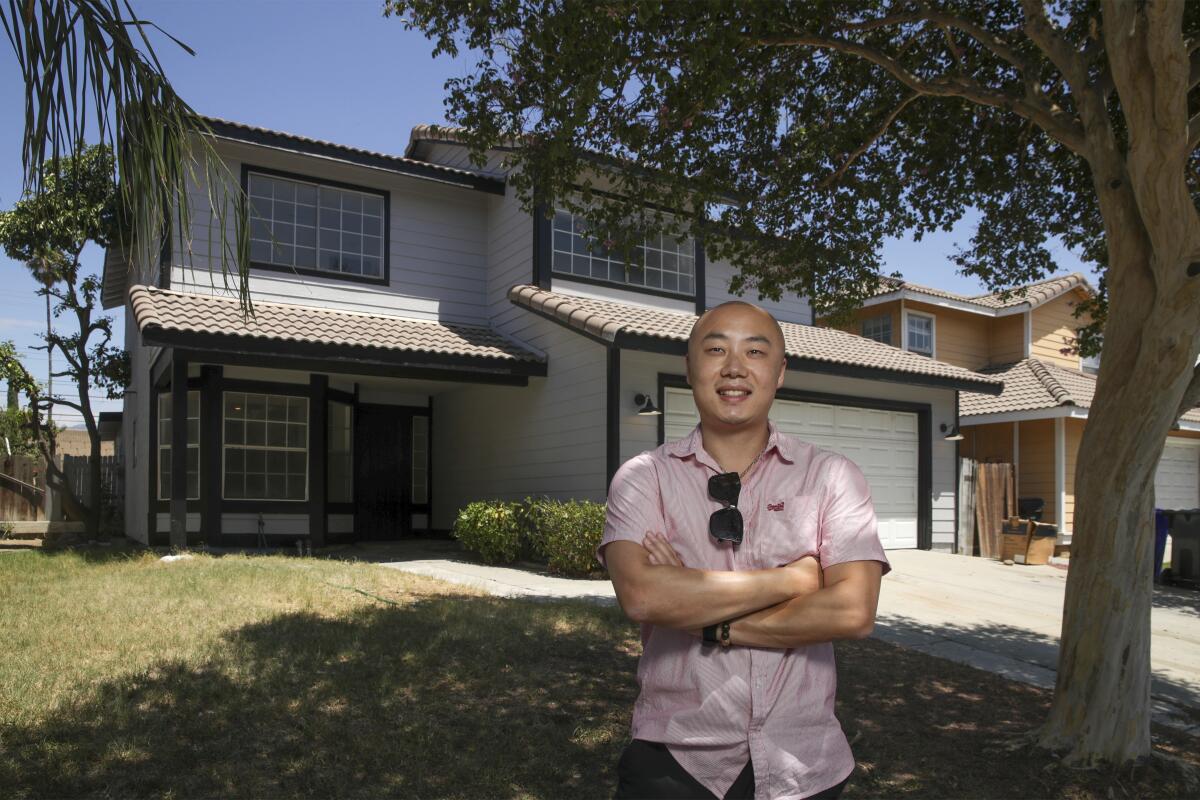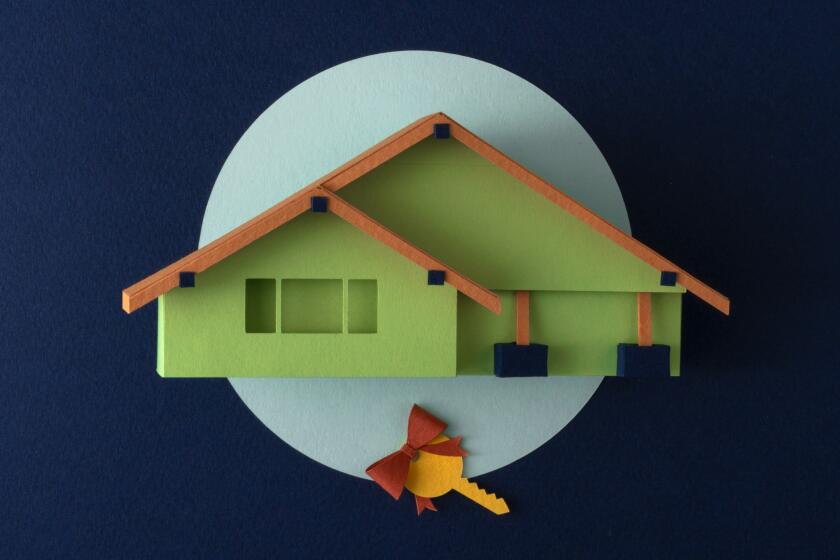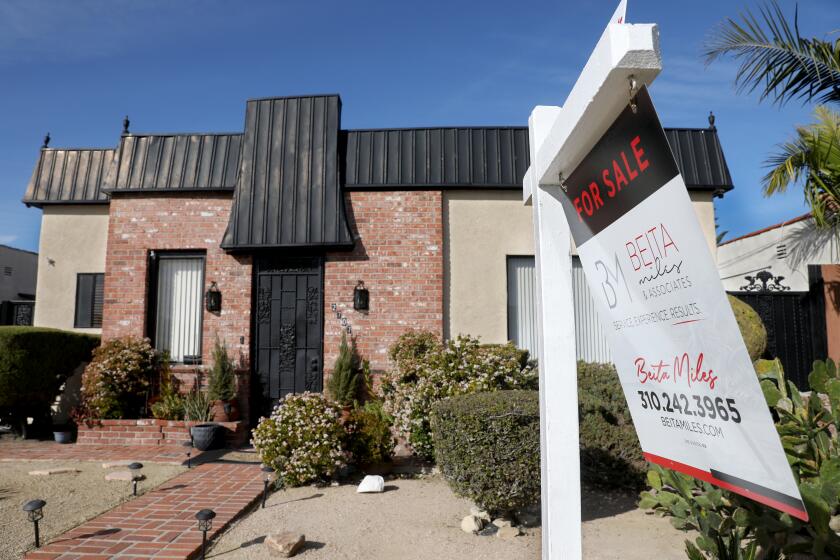Sellers strike? Some homeowners back out of a slowing housing market

As the housing market has slowed across Southern California and the country, sellers have had to adjust their expectations.
Homes that would have received dozens of offers at the beginning of the year get just a few these days. Other properties receive none, forcing owners to slash their asking price and relinquish dreams of record profits.
Now, some would-be sellers are calling it quits all together. Those decisions essentially cap how high inventory can climb, with broad implications for current homeowners and future buyers.
“It puts a floor on home values if people decide not to list their homes,” said Ralph McLaughlin, chief economist with real estate data firm Kukun, noting fewer homes to choose from helps keep prices from plunging.
According to real estate agents, reasons vary for the wait-and-see approach.
Some owners want to sell only if they can get a certain price that’s now tough in a market slowed by rising rates.
Others have a mortgage with the 3%-and-under interest rates of the past and don’t want to ditch it to borrow at 5%. With fears of a recession heightened, there’s also hesitation that comes with any economic uncertainty.
“The people who are still interested in selling are the people who are having life changes — babies, death, divorce, marriage,” said Lindsay Katz, a Los Angeles agent at Redfin, the brokerage company.
A no-BS guide to buying your first home in Southern California.
For Ara Kassabian, there’s no deadline forcing his hand. The 56-year-old software engineer wants to eventually sell his three-bedroom home in Glendale, take the proceeds and retire in Portugal.
He had been planning to do that in coming months, but no longer.
If he sold his home now, Kassabian estimates he’d pocket a couple of hundred thousand dollars less than if the market had stayed hot — extra money that could’ve gone a long way in Portugal, a country that has emerged as a destination for Californians seeking a more affordable lifestyle.
“If I wait a year, probably the market will take off again, and I could get a lot more,” he said. “I am not being pushed out of work.”
Across the country, Redfin data show the total number of homes for sale in major metro areas was nearly 4% higher in the four weeks ended Aug. 7 than the same period a year earlier.

Subscribers get exclusive access to this story
We’re offering L.A. Times subscribers special access to our best journalism. Thank you for your support.
Explore more Subscriber Exclusive content.
But the rise is largely because the homes that hit the market are taking longer to sell. Over the same period, the number of homes listed for the first time fell nearly 12%.
The same pattern — more total homes for sale but fewer new listings hitting the market each month — can be seen in Riverside, San Bernardino, Ventura and San Diego counties.
In Orange County, total inventory is essentially flat from a year earlier, and new listings are down sharply.
In Los Angeles County, Redfin data show there were 7% fewer homes for sale during the four weeks ended Aug. 7 than a year earlier, and the number of new listings plunged 30%.
In mid-May, before the market cooled drastically, the total number of homes for sale in L.A. County was down nearly 16% from year-earlier levels, and the number of new listings was down 0.7%.
What happens next depends on a variety of factors, including the direction of mortgage rates and the overall economy.
Home price appreciation is slowing, but prices are still up compared with those of last year.
Some economists think prices will keep climbing, but at a slower pace than in recent years. Others predict Southern California home prices will fall by the mid- to upper single digits in 2023.
Where the two sides agree is that the instinct to avoid selling in a slow market is a major reason why home values shouldn’t plunge as they did when the early-2000s bubble burst.
The Southern California housing market is cooling and forcing buyers and sellers to adjust. Here is what you should know if you are in the market.
Then, a wave of forced selling at a loss — through foreclosures and short sales — tanked the market and brought Southern California prices down 50% over two years, according to one gauge from real estate firm DQNews.
If unemployment rises, more people may lose their homes to foreclosure or otherwise be forced to sell, putting increased downward pressure on prices, said Redfin chief economist Daryl Fairweather.
But she and many other economists say any economic downturn should be relatively mild, and tighter underwriting standards during this housing boom should limit forced sales in the case of job losses.
“Homeowners, unlike [right before] the Great Recession, are very financially stable,” Fairweather said, citing higher credit scores and down payments. “It would take a lot for them to be in a position where they have to sell.”
One other option owners have is to rent out their property, an attractive alternative because the market for leases is still extremely competitive.
In the last month, Kevin Chen, a Southern California house flipper, has listed about five homes for rent that he had planned to sell until the housing slowdown squeezed his profit margin.
On some deals, he estimated he would have even lost money if he had sold. One of those was a five-bedroom house in the Inland Empire city of Highland that Chen instead listed for $3,150 a month.
About 15 potential renters showed up at the open house, with several telling Chen the same thing.
“We were looking for something to buy,” Chen recalled being told. “And all of a sudden we couldn’t afford it anymore because of the interest rates.”
More to Read
Sign up for This Evening's Big Stories
Catch up on the day with the 7 biggest L.A. Times stories in your inbox every weekday evening.
You may occasionally receive promotional content from the Los Angeles Times.












